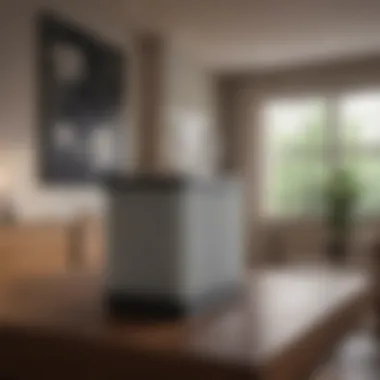Comprehensive Guide to the Best Rated Home Air Filters


Intro
Maintaining indoor air quality is vital for health and wellbeing. Clean air filters play a crucial role in this process. These filters trap dust, allergens, and other airborne particles, effectively improving the air we breathe at home.
This guide will explore the best rated home air filters available in the market. We will discuss various types and features that contribute to their effectiveness. Additionally, we will provide insights on how to choose the right filter for your specific needs. Ultimately, this guide aims to empower homeowners to make informed decisions about air filtration systems, fostering a healthier living environment.
Types of Home Air Filters
When selecting an air filter, understanding the options available is key. Various types serve different purposes. The most common ones include:
- HEPA Filters: High Efficiency Particulate Air (HEPA) filters capture 99.97% of particles as small as 0.3 microns. They are highly effective for individuals with allergies or asthma.
- Activated Carbon Filters: These filters utilize activated carbon to absorb odors, smoke, and chemical gases. They work well in spaces prone to strong smells.
- Electrostatic Filters: Built with charged materials, these filters attract and trap particles. They offer efficient filtration and are reusable after washing.
- UV Filters: Ultra Violet filters are effective for eliminating bacteria and viruses. They complement other types of filters, especially in areas with higher air purity demands.
Key Features to Consider
Selecting the right air filter involves evaluating specific features:
- MERV Rating: Minimum Efficiency Reporting Value (MERV) indicates a filter's ability to capture particles. A higher MERV rating means better filtration.
- Size: Ensure the filter fits your HVAC system or air purifier. Incorrect sizes reduce efficiency.
- Lifespan: Some filters need frequent changes, while others have longer lifetimes. Understand your maintenance needs.
- Noise Level: Certain filters and systems may produce noise. Consider the noise level if your space requires a quieter environment.
Choosing the Right Filter
Identifying your air quality needs is essential. Factors to consider include:
- The presence of allergens or pollutants in your environment.
- The sensitivity of household members to air quality issues.
- The specific applications of your heating or cooling system.
Research each type's advantages and read reviews. This thorough analysis will guide your decision, ensuring you choose a filter that enhances your home’s air quality effectively.
"Investing in a quality air filter is investing in your health. The air we breathe greatly influences our overall wellbeing."
Maintenance and Upkeep
To ensure optimal performance, regular maintenance of air filters is necessary. Follow this seasonal maintenance checklist:
- Check filter location and accessibility.
- Inspect filters monthly.
- Change filters as required, typically every 3 to 6 months for most types.
Here are some cleaning and organization tips:
- Label Filters: Use clear labels to indicate types and installation dates.
- Create a Schedule: Set reminders to check and replace filters regularly.
- Store Extra Filters: Keep a few extra filters on hand for quick replacements when needed.
Maintaining your home air filters not only extends their life but also ensures better air quality.
Epilogue
Understanding the functions and features of home air filters is essential. It allows homeowners to make informed decisions to enhance indoor air quality. The right filter can make a significant difference in health and comfort. By exploring options, evaluating features, and maintaining filters properly, you can achieve a cleaner home atmosphere.
Understanding Home Air Filters
Home air filters are pivotal in fostering a healthier living environment. Understanding these systems reveals their essential role in improving indoor air quality and safeguarding inhabitants from airborne pollutants.
Definition of Air Filters
Air filters are devices designed to remove particulates from the air. They operate through various mechanisms, including mechanical filtration, electrostatic attraction, and adsorption. When air moves through these filters, contaminants such as dust, pollen, smoke, and pet dander are captured, preventing them from circulating in your living space. The effectiveness of an air filter is mostly defined by its construction, including the material used and the design of the filter itself.
Significance of Air Filtration
The importance of air filtration cannot be overstated. It directly impacts the air quality within homes, affecting health and comfort levels. People suffering from allergies or respiratory issues, such as asthma, can find relief with an efficient air filtration system.
More broadly, improved indoor air quality leads to various benefits:
- Reduction of Allergens: Effective air filters can significantly decrease airborne allergens.
- Prevention of Respiratory Issues: Clean air supports better respiratory health and reduces the risk of complications.
- Enhanced Overall Comfort: Folks often experience greater comfort levels in cleaner air.
"Poor air quality can lead to discomfort and health issues, making air filters essential for modern homes."
Types of Home Air Filters
Understanding the different types of home air filters is crucial for making informed decisions about improving indoor air quality. Each type offers unique benefits and operates on various principles, impacting their effectiveness in filtering pollutants. Consciously choosing the right filter can lead to significant improvements in both air quality and health, especially for sensitive individuals or those with allergies.
HEPA Filters
High-Efficiency Particulate Air (HEPA) filters are widely recognized for their superior filtration capabilities. They must meet specific performance standards, capturing at least 99.97% of particles that are 0.3 microns or larger. This includes dust, pollen, pet dander, and some bacteria. The dense fibers in HEPA filters create a mechanical barrier that traps these pollutants as air passes through.
The benefits of using HEPA filters are clear:
- Health Benefits: Reduces allergens and irritants in the air, which is particularly important for allergy sufferers and asthmatics.
- Indoor Air Quality: Helps maintain clean and fresh breathing air, creating a healthier environment.
- Durability: Typically last longer than traditional filters, though they may be more expensive initially.
However, it is vital to consider the filter's maintenance. Regular replacement is necessary to maintain efficiency and airflow.


Electrostatic Filters
Electrostatic filters utilize a different approach. They charge incoming particles, which then stick to the filter material, effectively trapping dust and allergens. These filters are reusable and can often be washed, making them convenient for homeowners looking to reduce waste and save on costs.
Advantages of electrostatic filters include:
- Cost Efficiency: Though the initial purchase may be higher, their reusable nature makes them economical over time.
- Versatility: Suitable for various HVAC systems and can adapt to different air quality needs.
- Low Resistance: Generally allow for better airflow compared to HEPA filters, reducing energy consumption.
However, they might not capture as many fine particles as HEPA filters.
UV Filters
Ultraviolet (UV) filters work differently by using UV light to kill or deactivate pathogens like bacteria and viruses. They do not filter particles; instead, they sterilize the air that passes through. This technology is gaining traction, especially in settings that require high levels of cleanliness.
Key benefits of UV filters include:
- Pathogen Control: Effective in reducing microorganisms that conventional filters might miss.
- Complementary Use: Can be combined with other filters for more comprehensive air purification.
On the downside, their efficacy relies on the proper installation and maintenance of the UV light source.
Carbon Filters
Carbon filters use activated carbon to adsorb odors and chemicals in the air. The porosity of the carbon material gives it a large surface area, making it effective at trapping gaseous pollutants such as volatile organic compounds (VOCs) and smoke.
Benefits include:
- Odor Control: Particularly effective at eliminating smoking and cooking smells, making them ideal for kitchens and living rooms.
- Chemical Filtration: Helps reduce harmful pollutants released from materials and products commonly found in homes.
Nevertheless, carbon filters have limitations; they don't generally capture particulate matter well, which may necessitate using them alongside other filter types.
In summary, select the air filter that best meets your specific needs for air quality improvement, considering aspects such as filtration efficiency, cost, maintenance, and air purification requirements.
Key Features to Consider
When evaluating the right home air filter, several key features significantly influence performance and results. Understanding these elements is fundamental for ensuring a healthy indoor environment. Selecting an air filter involves considering factors such as MERV ratings, lifespan, size, noise levels, and overall cost. Each of these components holds importance in the effectiveness and suitability of the air filter chosen for specific needs.
MERV Ratings
MERV, or Minimum Efficiency Reporting Value, is a crucial metric that quantifies an air filter's ability to capture airborne particles. Ranging from 1 to 20, this rating informs users about how effectively a filter can trap dust, pollen, and other allergens. Filters with a MERV rating of 8 to 12 are typically efficient for household use, striking a balance between air quality and airflow. Higher MERV ratings tend to trap smaller particles more effectively but may restrict airflow, which can put strain on heating and cooling systems. It is essential to find a filter with an appropriate MERV rating for your needs while ensuring the HVAC system can handle it.
Filter Lifespan
The lifespan of an air filter is another significant factor to consider. Filters are designed with varying lifespans, some lasting up to three months, while others may be effective for longer periods. Generally, reusable filters have longer lifespans compared to disposable ones. However, disposable filters need to be replaced regularly to maintain efficient performance. By monitoring the filter's effectiveness, homeowners can improve air quality while minimizing costs associated with frequent replacements. Evaluating the frequency of replacements can help determine which type of filter fits your household routines better.
Size and Fit
Proper size and fit are essential in achieving optimal filtration performance. Air filters come in various dimensions, and it is vital to select a size that fits your HVAC system or air purifiers. Installing the wrong size can lead to insufficient air filtration and reduced efficiency. Homeowners should consult their system specifications or measure existing filters to ensure a good fit. Ensuring the right size can drastically enhance indoor air quality, and this makes it a non-negotiable consideration when shopping for air filters.
Noise Levels
Some air filters, particularly those integrating fans or motors, may produce noticeable noise during operation. For households sensitive to sound, noise levels become important criteria when selecting air filters. Assessing noise levels can help prevent disturbances, especially in quiet environments like bedrooms or libraries. If you prioritize a quiet operation, consider models that specialize in low-noise functionality. Checking customer reviews can also provide insight into how noisy a particular filter might be in practice.
Cost and Maintenance
Finally, evaluating both the cost and maintenance of air filters becomes necessary. The initial price may range widely depending on brand, type, and technology. However, homeowners must consider long-term maintenance costs, including the frequency of replacements and possible cleaning needed for reusable filters. Balancing purchase cost with overall expense involving maintenance can yield savings in the long run. It makes sense to invest in high-quality filters that minimize future costs and provide better air quality.
Understanding key features helps in making informed decisions about home air filters. Each element contributes to the filter's effectiveness and overall performance.
Selecting the right features tailored to individual needs can make a substantial impact on indoor air quality and health.
Comparison of Air Filters
In exploring the realm of home air filtration, understanding the distinctions between different types of filters is crucial. The right choice in air filters can significantly affect indoor air quality, ultimately contributing to better health and comfort in a living environment. This section dissects two pivotal comparisons: HEPA versus Electrostatic filters, and UV versus Carbon filters, shedding light on their unique attributes, operational principles, and ideal applications.
HEPA vs. Electrostatic
HEPA filters, or High-Efficiency Particulate Air filters, are widely regarded for their ability to capture at least 99.97% of airborne particles measuring 0.3 microns in diameter. This includes dust, pollen, pet dander, and even some bacteria. Their robust design makes them a formidable choice for those suffering from allergies or respiratory issues. HEPA filters excel in environments where particulate matter is abundant, ensuring cleaner air with each pass.
On the other hand, electrostatic filters leverage static electricity to attract and trap particles. These filters are often washable and can last longer than standard HEPA filters. Unlike HEPA, they require regular cleaning to maintain their efficiency. Their design is less bulky, which appeals to those with space constraints. However, while they can capture smaller particles, HEPA filters outperform them in terms of overall filtration efficacy.
When choosing between these two types, homeowners should consider the following:
- Allergy Sensitivity: HEPA filters are typically better for allergy sufferers.
- Maintenance Commitment: Electrostatic filters need regular cleaning, while HEPA filters are more of a set-and-forget option.
- Cost Consideration: Initial investment in HEPA filters may be higher, but their effectiveness can offer better long-term value in terms of health benefits.
UV vs. Carbon
UV filters utilize ultraviolet light to kill or deactivate microorganisms, proving particularly effective against pathogens like bacteria and viruses. When paired with other filtration systems, UV filters help ensure that the air remains not only particulate-free but also free of harmful agents. However, this type can sometimes miss larger particulate matter. Additionally, UV filters must be combined with a physical filtration system to address particulate pollutants.


Conversely, Carbon filters specialize in removing odors and volatile organic compounds (VOCs). They contain activated carbon, which absorbs these particles, thus improving air freshness. Carbon filters do not provide much protection against particulates or microorganisms, making them less comprehensive than HEPA and UV solutions.
The contrast between UV and Carbon filters also presents important considerations:
- Air Quality Needs: If odor removal is the top priority, carbon filters are ideal. For microbial concerns, UV filters shine.
- Combination Use: Using both types in a dual-system can maximize air purification, with carbon addressing odors and UV focusing on pathogens.
- Installation Requirements: Both types may require more complex installation compared to standard filters, so assessing home HVAC system compatibility is essential.
"The choice between different air filters should be informed by specific health needs and air quality goals."
By weighing these comparative aspects carefully, homeowners can make an educated decision on which air filter suits their living environment best.
Top Rated Home Air Filters
In this section, we delve into the essence of top rated home air filters. These filters play a crucial role in improving indoor air quality. Choosing a quality air filter means investing in a healthier living environment. The filters discussed here meet high standards, offering reliable performance.
Key aspects that will be highlighted include efficiency, maintenance needs, and user reviews. Features like MERV ratings will be considered, which indicate the filter's capacity to trap pollutants. A reliable filter reduces airborne particles, contributing positively to respiratory health.
The evaluation not only focuses on the filters’ effectiveness but also on the value they provide, making it easier for homeowners to select the right option. With numerous brands available, the competition leads to innovations and better performance. Understanding these top rated options ensures a more informed decision.
Brand A Overview
Features
Brand A is known for its sturdy construction and high efficiency. Its standout feature is the HEPA certification, which guarantees it can capture at least 99.97% of particles measuring 0.3 microns. This feature positions it as a beneficial choice for anyone concerned with allergens and fine dust.
The filter’s technology reduces the load on air conditioning systems, which can result in energy savings. However, it is essential to consider the replacements every six months, which adds to cost over time.
Pros and Cons
The advantages of Brand A include its exceptional filtration capabilities and trusted reputation. However, users may find the initial cost relatively high compared to standard options. Regular maintenance is also necessary to maintain its effectiveness.
Overall, it is popular for those prioritizing air quality.
Customer Feedback
Customers consistently praise Brand A for its efficiency in reducing allergens. Many report noticeable improvements in their indoor air quality. Complaints mainly revolve around the cost of replacements and the noise level, which is slightly higher compared to other brands. Nonetheless, the general sentiment is positive with a significant number of loyal customers recommending it.
Brand B Overview
Features
Brand B offers a different approach with its electrostatic filtration technology. This feature attracts users who prefer a reusable solution. The filters are washable, making them environmentally friendly and cost-effective over time.
With a reasonable MERV rating, these filters catch a variety of particles. However, they may lack the effectiveness of higher-rated HEPA filters.
Pros and Cons
The standout benefit of Brand B is its reusability, which can be a financial advantage in the long run. The drawback is that it may not capture the smallest particles as effectively as others. Users seeking strong air purification might find this aspect limiting, especially in high-pollen regions.
Customer Feedback
Feedback for Brand B is generally favorable. Users appreciate the washable feature, noting it as a significant convenience. However, some have expressed concerns about performance in heavily polluted areas. This variance in feedback is important for users to consider based on their specific needs.
Brand Overview
Features
Brand C integrates both carbon and HEPA technologies. This combination allows it to excel in odor removal and trapping allergens. Its activated carbon layer is particularly effective for eliminating unpleasant smells from pets and cooking, making it a versatile option.
The dual filtration system makes it a popular choice among users who have diverse air quality concerns.
Pros and Cons
One of the benefits of Brand C is its ability to combat multiple pollution sources. However, its complexity means more regular maintenance, as both filters may need replacing at different times. Users must factor in these additional costs.
Customer Feedback
User reviews highlight Brand C’s effectiveness in reducing odors and allergens. Many users report positive experiences, especially in households with pets. The primary criticism concerns the frequency of replacements, which some find inconvenient. Despite this, many recommend it for those needing comprehensive solutions for air quality.
Installation Considerations
Understanding the installation considerations for air filters is vital for homeowners seeking to enhance their indoor air quality. Proper installation not only maximizes the effectiveness of the filter but also ensures safety and efficiency in the long run. Choosing between professional installation and a DIY approach can significantly impact the overall performance of the air filtration system.
Professional Installation vs. DIY
When it comes to installing home air filters, there are two primary options: hiring a professional or undertaking a do-it-yourself project.
Professional Installation offers several advantages:


- Expertise: Professionals possess the necessary knowledge and skills to install filters correctly. This reduces the risk of errors that could compromise air quality.
- Time-Saving: Hiring a professional can save time. They can complete the installation quickly and efficiently.
- Warranty Protection: Many manufacturers require professional installation for warranty validation. Choosing this option helps ensure that the warranty remains intact.
On the other hand, DIY installation can be appealing for those looking to save on costs and gain hands-on experience.
- Cost-Effective: Doing it yourself can be less expensive. There are no labor costs involved.
- Personal Satisfaction: Many homeowners find satisfaction in completing home improvement tasks independently.
- Learning Opportunity: DIY projects provide a chance to learn more about home systems and maintenance.
However, DIY installation requires careful consideration. It is crucial to follow the manufacturer’s instructions and have a basic understanding of the system involved. Missteps during installation can lead to inefficient filtration or system damage.
Maintenance Practices
The lifespan of air filters is directly linked to proper maintenance. Regular maintenance ensures that filters operate efficiently and continue to enhance air quality in the home. Here are important practices to consider:
- Routine Inspection: Regularly check filters for dirt and dust buildup. Depending on usage, filters should be inspected at least once a month.
- Replacement Frequency: Follow the manufacturer's guidelines for replacing filters. Most filters need replacing every three months, but heavily used systems may require more frequent changes.
- Cleaning Procedures: For reusable filters, develop a cleaning schedule. Ensure that filters are cleaned according to the manufacturer's instructions to avoid damaging them.
- System Optimization: Keep the surrounding area of the air filter clean. Dust and debris can hinder performance.
The Impact of Air Filters on Health
Air filters play a crucial role in maintaining good indoor air quality, which can significantly affect overall health. This section delves into the various impacts that air filters can have on health, particularly focusing on allergies and respiratory conditions like asthma. Understanding these benefits is essential for homeowners and those concerned about their indoor environment.
Allergies and Air Quality
Allergies are often aggravated by airborne particles, including pollen, dust mites, mold spores, and pet dander. Air filters serve as a first line of defense against these irritants. By trapping allergens, they help reduce their presence in indoor spaces. This reduction is critical for sensitive individuals. When air quality improves, allergy symptoms tend to decrease.
Benefits of using air filters for allergies:
- Reduction of Symptoms: Many report fewer sneezing, runny noses, and itchy eyes when using effective air filters.
- Enhanced Comfort: A cleaner air environment can make living spaces more comfortable, particularly in allergy-prone seasons.
- Improved Concentration: Better air quality can lead to enhanced focus and productivity, especially for those who work from home.
The choice of air filter is essential. HEPA filters, known for their high efficiency, are particularly effective at capturing the fine particles that cause allergies.
Asthma and Respiratory Issues
Asthma is a complex condition, often triggered by environmental factors. Pollutants and allergens in the air can exacerbate asthma symptoms and lead to serious health issues. Here, air filters can provide significant benefits by maintaining a healthier indoor air environment.
Key effects of air filters on asthma:
- Reducing Triggers: By filtering out harmful particles, air filters can help reduce common asthma triggers such as smoke, dust, and pet dander.
- Fewer Attacks: Consistent use of quality air filters has been shown to result in less frequent asthma attacks and hospital visits for many individuals.
- Overall Health Improvement: Long-term use can result in better lung health and can contribute to fewer respiratory complications over time.
"Regular air filter maintenance and replacement is essential for preserving filtering capabilities and, thereby, health benefits."
Future Trends in Air Filtration
Air filtration is evolving rapidly. As concerns grow regarding indoor air quality, it becomes vital to stay informed about future trends in air filtration. Understanding these trends can help homeowners, interior design enthusiasts, and gardening aficionados choose better products and make informed decisions that benefit both health and comfort.
Technological Innovations
Advancements in technology are central to improving air filtration. New materials and designs enhance performance significantly. For example, smart air filters now integrate with home automation systems. They provide real-time monitoring of air quality, which allows users to react promptly to environmental changes.
Additionally, the emergence of machine learning algorithms enables filters to adapt their performance based on usage patterns. Systems can now predict when filters need changing, optimizing their lifespan and efficiency.
Another technological shift is the development of biological filters. These filters utilize living microorganisms to break down pollutants and improve air quality naturally. This approach is not only effective but also environmentally friendly.
Key features to look for in these innovations include:
- Real-time monitoring and reporting
- Self-adjusting filter efficiency
- Integration with existing home systems
Environmental Considerations
As awareness of sustainability increases, air filtration systems are becoming more eco-friendly. Manufacturers are focusing on reducing waste and energy consumption. This shift affects materials used in filter production and their overall design.
Filters made from recycled materials are gaining popularity. These products reduce environmental impact while still delivering high efficiency. Furthermore, energy-efficient filters consume less energy, which can lead to reduced utility bills over time.
Considerations for consumers also include:
- Recyclability of filters after use
- Energy consumption ratings of air filtration systems
- Lifecycle assessments of products
"Choosing an eco-friendly air filter not only benefits your health but also contributes to a healthier planet."
Ending
The conclusion of this article wraps up the vital discussions surrounding home air filters. It emphasizes their role in enhancing indoor air quality and how the right choice can significantly impact health and comfort. With increasing pollution levels and airborne contaminants, understanding air filtration systems becomes not just beneficial, but essential for homeowners.
Summary of Findings
In summary, the analysis presented in this guide reveals several key insights:
- Importance of Air Filters: The overall significance of using air filters in homes is underscored. They contribute to removing allergens and pollutants, offering a healthier living environment.
- Diverse Types and Features: Various types of air filters, such as HEPA, electrostatic, UV, and carbon filters, cater to distinct needs. Each type has unique features that affect their filtration efficiency.
- Technical Specifications: Key features like MERV ratings and filter lifespan were explored, highlighting how these elements dictate the effectiveness and frequency of replacements needed in air filter systems.
- DIY vs. Professional Installation: Considerations around installation methods provide clarity on whether homeowners should tackle it themselves or hire professional services.
- Health Implications: The connection between air quality and health issues, such as allergies and asthma, reinforces why taking air filtration seriously is paramount.
Learning these aspects equips readers with the knowledge necessary to navigate their options more effectively. By understanding the technical details and health benefits, one can better assess their specific needs, optimize their living spaces, and therefore contribute to their well-being.
Final Recommendations
Based on the findings presented, the following recommendations can guide homeowners in their journey to select and maintain effective air filters:
- Assess Individual Needs: Understand specific air quality needs in your household. Consider health conditions like asthma or allergies when selecting a filter.
- Choose Quality Over Price: Investing in a higher quality air filter often yields better long-term results and lower health risks, compared to cheaper alternatives that may not perform well.
- Keep Filters Maintained: Regularly clean or replace filters as recommended, as this ensures continued air quality improvement.
- Stay Updated with Technological Changes: Keep informed about new advancements in air filtration technology, as innovations can offer better efficacy and energy efficiency.
- Consult Professionals When Needed: When in doubt, seek professional advice to assess and install your air filtration systems, ensuring they operate at peak performance.







